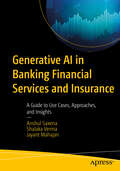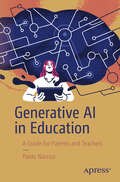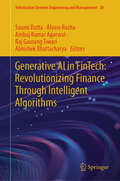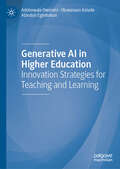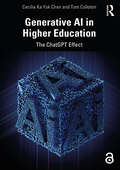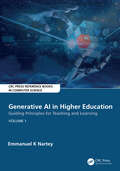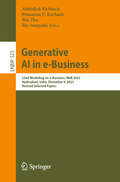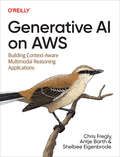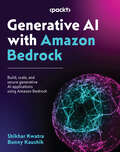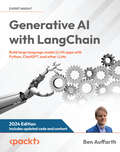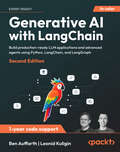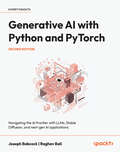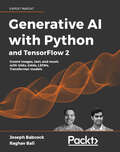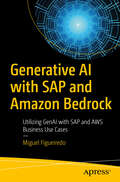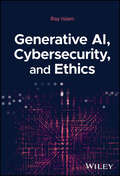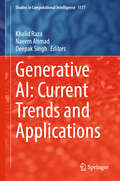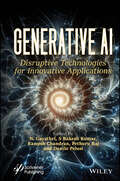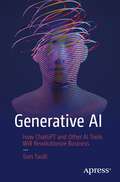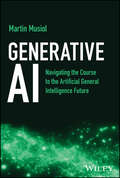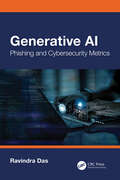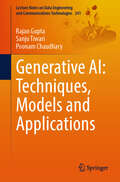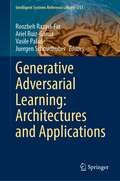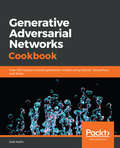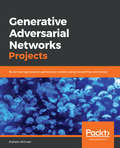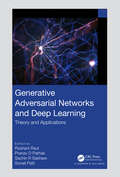- Table View
- List View
Generative AI in Banking Financial Services and Insurance: A Guide to Use Cases, Approaches, and Insights
by Anshul Saxena Shalaka Verma Jayant MahajanThis book explores the integration of Generative AI within the Banking, Financial Services, and Insurance (BFSI) sector, elucidating its implications, applications, and the future landscape of BFSI. The first part delves into the origins and evolution of Generative AI, providing insights into its mechanics and applications within the BFSI context. It goes into the core technologies behind Generative AI, emphasizing their significance and practical applications. The second part explores how Generative AI intersects with core banking processes, ranging from transactional activities to customer support, credit assessment, and regulatory compliance. It focuses on the digital transformation driving investment banking into the future. It also discusses AI’s role in algorithmic trading, client interactions, and regulatory adaptations. It analyzes AI-driven techniques in portfolio management, customer-centric solutions, and the next-generation approach to financial planning and advisory matters. The third part equips you with a structured roadmap for AI adoption in BFSI, highlighting the steps and the challenges. It outlines clear steps to assist BFSI institutions in incorporating Generative AI into their operations. It also raises awareness about the moral implications associated with AI in the BFSI sector. By the end of this book you will understand Generative AI’s present and future role in the BFSI sector. What You Will Learn Know what Generative AI is and its applications in the BFSI sector Understand deep learning and its significance in generative models Analyze the AI-driven techniques in portfolio management and customer-centric solutions Know the future of investment banking and trading with AI Know the challenges of integrating AI into the BFSI sector Who This Book Is For Professionals in the BFSI and IT sectors, including system administrators and programmers
Generative AI in Education: A Guide for Parents and Teachers
by Paolo NarcisoAs artificial intelligence (AI) rapidly transforms education, tools like ChatGPT and Claude are revolutionizing the way we teach and learn. This book is a groundbreaking book that empowers parents and students to navigate this exciting new frontier, filling a critical gap in the current literature. As the first comprehensive guide to generative AI in education designed for parents and students, Generative AI in Education is positioned to become an indispensable resource. It provides the knowledge and strategies needed to effectively integrate AI into their learning journeys, transforming educational outcomes and preparing students for success in a rapidly changing world. You’ll gain a deep understanding of how tools like ChatGPT and Claude work, and how they can be leveraged to support learning across various subjects and grade levels. You’ll then see how to create clear, specific, and engaging prompts that elicit valuable responses from AI-powered tools. This book contains all the techniques for tailoring prompts to different learning objectives, styles, and contexts, and how they can use AI tools to support reading comprehension, writing skills, problem-solving, and creative thinking. What You Will Learn Apply generative AI in education Craft effective prompts for personalized learning experiences Utilize AI tools to support learning, creativity, and problem-solving Who This Book is For Parents and students who are eager to harness the power of generative AI to enhance learning experiences and prepare for success in an AI-driven future
Generative AI in FinTech: Revolutionizing Finance Through Intelligent Algorithms (Information Systems Engineering and Management #26)
by Álvaro Rocha Abhishek Bhattacharya Soumi Dutta Ambuj Kumar Agarwal Raj Gaurang TiwariThis book delves into the intersection of generative artificial intelligence (AI) and the financial Technology (FinTech) industry. This book provides a comprehensive exploration of how Generative AI, a cutting-edge subset of artificial intelligence, is fundamentally altering the landscape of finance. It meticulously unravels the intricate ways in which advanced algorithms, powered by generative AI, are transforming traditional financial processes, decision-making, risk assessment, portfolio management, fraud detection, and more. Through a detailed analysis of theoretical concepts and practical applications, we illustrate how generative AI techniques, such as Generative Adversarial Networks (GANs) and Variational Autoencoders (VAEs), are empowering FinTech applications to generate synthetic financial data, optimize trading strategies, and enhance customer experiences. Readers will gain a deep understanding of the potential of generative AI to create realistic financial scenarios, model market behaviour, and simulate various economic conditions for better planning and strategizing. Moreover, this book offers insights into ethical considerations and potential challenges associated with the use of generative AI in the FinTech domain, emphasizing the importance of responsible and accountable deployment. Additionally, Generative AI in FinTech serves as a practical guide for professionals, researchers, and enthusiasts seeking to implement generative AI solutions within the financial sector. It presents case studies and real-world examples that demonstrate the effectiveness and impact of generative AI in various FinTech applications.
Generative AI in Higher Education: Innovation Strategies for Teaching and Learning
by Abiodun Egbetokun Oluwaseun Kolade Adebowale OwoseniWith the integration of generative artificial intelligence (AI), teachers and learners now have access to powerful tools to enhance their productivity and effectiveness in their work. To meet the demands of this dynamic educational landscape, teachers must embrace AI to handle repetitive tasks, freeing them to focus on more intelligent and humanistic responsibilities. For learners, responsible use of AI could make learning more fun, personalized, flexible, and enriching. This insightful new book explores the evolving role of educators in higher education in a world of rapid technological advancements and provides a practical outline of the available technologies. By integrating Generative AI into teaching and learning, Higher Education Institutions can contribute to achieving inclusive and equitable quality education, a target of the UN Sustainable Development Goals, and promote lifelong learning opportunities for all. Generative AI can be used to enhance teaching and learning experiences, foster creativity, and develop new learning experiences in higher education. This book is a valuable resource for educators navigating the ever-changing landscape of education technology. With scientific background, practical insights and actionable tips, this book will be of interest to scholars of emerging technologies and innovation in education. It will also be of practical use to instructors seeking to harness the power of generative AI, enhancing productivity and transforming their approach to personalized learning.
Generative AI in Higher Education: The ChatGPT Effect
by Cecilia Ka Chan Tom CollotonChan and Colloton’s book is one of the first to provide a comprehensive examination of the use and impact of ChatGPT and Generative AI (GenAI) in higher education.Since November 2022, every conversation in higher education has involved ChatGPT and its impact on all aspects of teaching and learning. The book explores the necessity of AI literacy tailored to professional contexts, assess the strengths and weaknesses of incorporating ChatGPT in curriculum design, and delve into the transformation of assessment methods in the GenAI era. The authors introduce the Six Assessment Redesign Pivotal Strategies (SARPS) and an AI Assessment Integration Framework, encouraging a learner-centric assessment model. The necessity for well-crafted AI educational policies is explored, as well as a blueprint for policy formulation in academic institutions. Technical enthusiasts are catered to with a deep dive into the mechanics behind GenAI, from the history of neural networks to the latest advances and applications of GenAI technologies.With an eye on the future of AI in education, this book will appeal to educators, students and scholars interested in the wider societal implications and the transformative role of GenAI in pedagogy and research.
Generative AI in Higher Education: Volume 1 (CRC Press Reference Books in Computer Science)
by Emmanuel K NarteyDivided into two volumes, this book develops guiding principles for higher education institutions to use GenAI effectively and ethically in teaching and learning, articulating a roadmap for implementation at institutional levels and addressing the conundrum of using GenAI in higher education. As higher education institutions take different attitudes and approaches to Generative AI (GenAI), with some viewing it as a threat to academic integrity and therefore banning its use, while others have embraced it as an innovation to academic practice and have implemented guidance on how to use it ethically, this book makes clear that GenAI, such as ChatGPT, is not the problem itself; the issue is how we engage with it.
Generative AI in e-Business: 22nd Workshop on e-Business, WeB 2023, Hyderabad, India, December 9, 2023, Revised Selected Papers (Lecture Notes in Business Information Processing #525)
by Bin Zhu Abhishek Kathuria Prasanna P. Karhade Ria SonpatkiThis book constitutes revised selected papers from the 22nd Workshop on e-Business, WeB 2023, which took place in Hyderabad, India, on December 9, 2023. The purpose of WeB is to provide a forum for researchers and practitioners to discuss findings, novel ideas, and lessons learned to address major challenges and map out the future directions for e-Business. The WeB 2023 theme was “Generative AI in e-Business”. The 13 full papers included in this volume were carefully reviewed and selected from a total of 46 submissions. They focus on both the transformative potential and the challenges of integrating generative AI into e-business models, paving the way for a future where AI empowers businesses and enriches lives.
Generative AI on AWS: Building Context-Aware Multimodal Reasoning Applications
by Chris Fregly Antje Barth Shelbee EigenbrodeCompanies today are moving rapidly to integrate generative AI into their products and services. But there's a great deal of hype (and misunderstanding) about the impact and promise of this technology. With this book, Chris Fregly, Antje Barth, and Shelbee Eigenbrode from AWS help CTOs, ML practitioners, application developers, business analysts, data engineers, and data scientists find practical ways to use this exciting new technology.You'll learn the generative AI project life cycle including use case definition, model selection, model fine-tuning, retrieval-augmented generation, reinforcement learning from human feedback, and model quantization, optimization, and deployment. And you'll explore different types of models including large language models (LLMs) and multimodal models such as Stable Diffusion for generating images and Flamingo/IDEFICS for answering questions about images.Apply generative AI to your business use casesDetermine which generative AI models are best suited to your task Perform prompt engineering and in-context learningFine-tune generative AI models on your datasets with low-rank adaptation (LoRA)Align generative AI models to human values with reinforcement learning from human feedback (RLHF)Augment your model with retrieval-augmented generation (RAG)Explore libraries such as LangChain and ReAct to develop agents and actionsBuild generative AI applications with Amazon Bedrock
Generative AI with Amazon Bedrock: Build, scale, and secure generative AI applications using Amazon Bedrock
by Bunny Kaushik Shikhar KwatraBecome proficient in Amazon Bedrock by taking a hands-on approach to building and scaling generative AI solutions that are robust, secure, and compliant with ethical standardsKey FeaturesLearn the foundations of Amazon Bedrock from experienced AWS Machine Learning Specialist ArchitectsMaster the core techniques to develop and deploy several AI applications at scaleGo beyond writing good prompting techniques and secure scalable frameworks by using advanced tips and tricksPurchase of the print or Kindle book includes a free PDF eBookBook DescriptionThe concept of generative artificial intelligence has garnered widespread interest, with industries looking to leverage it to innovate and solve business problems. Amazon Bedrock, along with LangChain, simplifies the building and scaling of generative AI applications without needing to manage the infrastructure. Generative AI with Amazon Bedrock takes a practical approach to enabling you to accelerate the development and integration of several generative AI use cases in a seamless manner. You’ll explore techniques such as prompt engineering, retrieval augmentation, fine-tuning generative models, and orchestrating tasks using agents. The chapters take you through real-world scenarios and use cases such as text generation and summarization, image and code generation, and the creation of virtual assistants. The latter part of the book shows you how to effectively monitor and ensure security and privacy in Amazon Bedrock. By the end of this book, you’ll have gained a solid understanding of building and scaling generative AI apps using Amazon Bedrock, along with various architecture patterns and security best practices that will help you solve business problems and drive innovation in your organization.What you will learnExplore the generative AI landscape and foundation models in Amazon BedrockFine-tune generative models to improve their performanceExplore several architecture patterns for different business use casesGain insights into ethical AI practices, model governance, and risk mitigation strategiesEnhance your skills in employing agents to develop intelligence and orchestrate tasksMonitor and understand metrics and Amazon Bedrock model responseExplore various industrial use cases and architectures to solve real-world business problems using RAGStay on top of architectural best practices and industry standardsWho this book is forThis book is for generalist application engineers, solution engineers and architects, technical managers, ML advocates, data engineers, and data scientists looking to either innovate within their organization or solve business use cases using generative AI. A basic understanding of AWS APIs and core AWS services for machine learning is expected.
Generative AI with LangChain: Build large language model (LLM) apps with Python, ChatGPT, and other LLMs
by Ben Auffarth2024 Edition – Get to grips with the LangChain framework to develop production-ready applications, including agents and personal assistants. The 2024 edition features updated code examples and an improved GitHub repository. Purchase of the print or Kindle book includes a free PDF eBook. Key FeaturesLearn how to leverage LangChain to work around LLMs’ inherent weaknessesDelve into LLMs with LangChain and explore their fundamentals, ethical dimensions, and application challengesGet better at using ChatGPT and GPT models, from heuristics and training to scalable deployment, empowering you to transform ideas into realityBook DescriptionChatGPT and the GPT models by OpenAI have brought about a revolution not only in how we write and research but also in how we can process information. This book discusses the functioning, capabilities, and limitations of LLMs underlying chat systems, including ChatGPT and Gemini. It demonstrates, in a series of practical examples, how to use the LangChain framework to build production-ready and responsive LLM applications for tasks ranging from customer support to software development assistance and data analysis – illustrating the expansive utility of LLMs in real-world applications. Unlock the full potential of LLMs within your projects as you navigate through guidance on fine-tuning, prompt engineering, and best practices for deployment and monitoring in production environments. Whether you're building creative writing tools, developing sophisticated chatbots, or crafting cutting-edge software development aids, this book will be your roadmap to mastering the transformative power of generative AI with confidence and creativity.What you will learnCreate LLM apps with LangChain, like question-answering systems and chatbotsUnderstand transformer models and attention mechanismsAutomate data analysis and visualization using pandas and PythonGrasp prompt engineering to improve performanceFine-tune LLMs and get to know the tools to unleash their powerDeploy LLMs as a service with LangChain and apply evaluation strategiesPrivately interact with documents using open-source LLMs to prevent data leaksWho this book is forThe book is for developers, researchers, and anyone interested in learning more about LangChain. Whether you are a beginner or an experienced developer, this book will serve as a valuable resource if you want to get the most out of LLMs using LangChain. Basic knowledge of Python is a prerequisite, while prior exposure to machine learning will help you follow along more easily.
Generative AI with LangChain: Build production ready LLM applications and advanced agents using Python and LangGraph
by Ben Auffarth Leonid KuliginBeyond foundational LangChain documentation and LangGraph interfaces, learn enterprise patterns, key design pattern to build AI agents, battle-tested strategies, and proven architectures used in production. Ideal for Python developers building generative AI at scale. Key FeaturesGet to grips with building AI agents with LangGraphLearn about enterprise-grade testing, observability, and LLM evaluation frameworksCover RAG implementation with cutting-edge retrieval strategies and new reliability techniquesPurchase of the print or Kindle book includes a free PDF eBookBook DescriptionThis revised edition builds a foundation in agentic AI, LLM fundamentals, LangChain, & LangGraph for developers at all levels. Fully updated to cover the latest in LangChain and production LLM applications, it captures the evolving ecosystem and enterprise deployment landscape. New coverage includes multi-agent architectures, LangGraph interfaces, robust RAG techniques with hybrid search, re-rankers, and advanced fact-checking mechanisms, plus enterprise-grade testing frameworks. It provides coverage of key design patterns behind agentic systems, practical implementations of multi-agent systems for complex tasks. Explore cutting-edge agent strategies such as Tree of Thought, multi-agent orchestration, detailed error handling, and structured output generation. Coverage dedicated to evaluation, testing, and production deployment reflect the maturing LLM application landscape. Design secure, compliant AI systems with built-in production safeguards, responsible development practices, and a perspective on future research directions.The enhanced RAG coverage features techniques like hybrid search, re-rankers, and fact-checking mechanisms. Whether upgrading existing LLM applications or building new enterprise-scale solutions, by the end of the book, you will have updated knowledge on the practical patterns needed for production successWhat you will learnDesign and implement refined multi-agent systems using LangGraph Enterprise-grade testing and evaluation frameworks for LLM applications Deploy production-ready observability and monitoring solutions Build RAG systems with hybrid search and re-ranking capabilities Implement agents for software development and data analysis Work with latest LLMs and providers Google Gemini, Anthropic and Mistral, DeepSeek, and OpenAI o3-miniOptimize cost and performance across different deployment typesDesign secure, compliant AI systems with current best practicesWho this book is forThe book is for developers, researchers, and anyone interested in learning more about LangChain and LangGraph, wanting to build production-ready LLM applications. This book emphasizes on enterprise deployment patterns, making it especially valuable for teams implementing LLM solutions at scale. While the first edition focused on individual developers, this version also caters to engineering teams and decision-makers implementing enterprise-wide LLM strategies. Basic knowledge of Python is a prerequisite, while prior exposure to machine learning will help you follow along more easily.
Generative AI with Python and PyTorch: Navigating the AI frontier with LLMs, Stable Diffusion, and next-gen AI applications
by Raghav Bali Joseph BabcockMaster GenAI techniques to create images and text using variational autoencoders (VAEs), generative adversarial networks (GANs), LSTMs, and large language models (LLMs)Key FeaturesImplement real-world applications of LLMs and generative AIFine-tune models with PEFT and LoRA to speed up trainingExpand your LLM toolbox with Retrieval Augmented Generation (RAG) techniques, LangChain, and LlamaIndexPurchase of the print or Kindle book includes a free eBook in PDF formatBook DescriptionBecome an expert in Generative AI through immersive, hands-on projects that leverage today’s most powerful models for Natural Language Processing (NLP) and computer vision. Generative AI with Python and PyTorch is your end-to-end guide to creating advanced AI applications, made easy by Raghav Bali, a seasoned data scientist with multiple patents in AI, and Joseph Babcock, a PhD and machine learning expert. Through business-tested approaches, this book simplifies complex GenAI concepts, making learning both accessible and immediately applicable. From NLP to image generation, this second edition explores practical applications and the underlying theories that power these technologies. By integrating the latest advancements in LLMs, it prepares you to design and implement powerful AI systems that transform data into actionable intelligence. You’ll build your versatile LLM toolkit by gaining expertise in GPT-4, LangChain, RLHF, LoRA, RAG, and more. You’ll also explore deep learning techniques for image generation and apply styler transfer using GANs, before advancing to implement CLIP and diffusion models. Whether you’re generating dynamic content or developing complex AI-driven solutions, this book equips you with everything you need to harness the full transformative power of Python and AI.What you will learnGrasp the core concepts and capabilities of LLMsCraft effective prompts using chain-of-thought, ReAct, and prompt query language to guide LLMs toward your desired outputsUnderstand how attention and transformers have changed NLPOptimize your diffusion models by combining them with VAEsBuild text generation pipelines based on LSTMs and LLMsLeverage the power of open-source LLMs, such as Llama and Mistral, for diverse applicationsWho this book is forThis book is for data scientists, machine learning engineers, and software developers seeking practical skills in building generative AI systems. A basic understanding of math and statistics and experience with Python coding is required.
Generative AI with Python and TensorFlow 2: Create images, text, and music with VAEs, GANs, LSTMs, Transformer models
by Joseph Babcock Raghav BaliFun and exciting projects to learn what artificial minds can createKey FeaturesCode examples are in TensorFlow 2, which make it easy for PyTorch users to follow alongLook inside the most famous deep generative models, from GPT to MuseGANLearn to build and adapt your own models in TensorFlow 2.xExplore exciting, cutting-edge use cases for deep generative AIBook DescriptionMachines are excelling at creative human skills such as painting, writing, and composing music. Could you be more creative than generative AI?In this book, you'll explore the evolution of generative models, from restricted Boltzmann machines and deep belief networks to VAEs and GANs. You'll learn how to implement models yourself in TensorFlow and get to grips with the latest research on deep neural networks.There's been an explosion in potential use cases for generative models. You'll look at Open AI's news generator, deepfakes, and training deep learning agents to navigate a simulated environment. Recreate the code that's under the hood and uncover surprising links between text, image, and music generation.What you will learnExport the code from GitHub into Google Colab to see how everything works for yourselfCompose music using LSTM models, simple GANs, and MuseGANCreate deepfakes using facial landmarks, autoencoders, and pix2pix GANLearn how attention and transformers have changed NLPBuild several text generation pipelines based on LSTMs, BERT, and GPT-2Implement paired and unpaired style transfer with networks like StyleGANDiscover emerging applications of generative AI like folding proteins and creating videos from imagesWho this book is forThis is a book for Python programmers who are keen to create and have some fun using generative models. To make the most out of this book, you should have a basic familiarity with math and statistics for machine learning.
Generative AI with SAP and Amazon Bedrock: Utilizing GenAI with SAP and AWS Business Use Cases
by Miguel FigueiredoExplore Generative AI and understand its key concepts, architecture, and tangible business use cases. This book will help you develop the skills needed to use SAP AI Core service features available in the SAP Business Technology Platform. You’ll examine large language model (LLM) concepts and gain the practical knowledge to unleash the best use of Gen AI. As you progress, you’ll learn how to get started with your own LLM models and work with Generative AI use cases. Additionally, you’ll see how to take advantage Amazon Bedrock stack using AWS SDK for ABAP. To fully leverage your knowledge, Generative AI with SAP and Amazon Bedrock offers practical step-by-step instructions for how to establish a cloud SAP BTP account model and create your first GenAIartifacts. This work is an important prerequisite for those who want to take full advantage of generative AI with SAP. What You Will Learn Master the concepts and terminology of artificial intelligence and GenAI Understand opportunities and impacts for different industries with GenAI Become familiar with SAP AI Core, Amazon Bedrock, AWS SDK for ABAP and develop your firsts GenAI projects Accelerate your development skills Gain more productivity and time implementing GenAI use cases Who this Book Is For Anyone who wants to learn about Generative AI for Enterprise and SAP practitioners who want to take advantage of AI within the SAP ecosystem to support their systems and workflows.
Generative AI, Cybersecurity, and Ethics
by Mohammad Rubyet Islam“Generative AI, Cybersecurity, and Ethics’ is an essential guide for students, providing clear explanations and practical insights into the integration of generative AI in cybersecurity. This book is a valuable resource for anyone looking to build a strong foundation in these interconnected fields.” —Dr. Peter Sandborn, Professor, Department of Mechanical Engineering, University of Maryland, College Park “Unchecked cyber-warfare made exponentially more disruptive by Generative AI is nightmare fuel for this and future generations. Dr. Islam plumbs the depth of Generative AI and ethics through the lens of a technology practitioner and recognized AI academician, energized by the moral conscience of an ethical man and a caring humanitarian. This book is a timely primer and required reading for all those concerned about accountability and establishing guardrails for the rapidly developing field of AI.” —David Pere, (Retired Colonel, United States Marine Corps) CEO & President, Blue Force Cyber Inc. Equips readers with the skills and insights necessary to succeed in the rapidly evolving landscape of Generative AI and cyber threats Generative AI (GenAI) is driving unprecedented advances in threat detection, risk analysis, and response strategies. However, GenAI technologies such as ChatGPT and advanced deepfake creation also pose unique challenges. As GenAI continues to evolve, governments and private organizations around the world need to implement ethical and regulatory policies tailored to AI and cybersecurity. Generative AI, Cybersecurity, and Ethics provides concise yet thorough insights into the dual role artificial intelligence plays in both enabling and safeguarding against cyber threats. Presented in an engaging and approachable style, this timely book explores critical aspects of the intersection of AI and cybersecurity while emphasizing responsible development and application. Reader-friendly chapters explain the principles, advancements, and challenges of specific domains within AI, such as machine learning (ML), deep learning (DL), generative AI, data privacy and protection, the need for ethical and responsible human oversight in AI systems, and more. Incorporating numerous real-world examples and case studies that connect theoretical concepts with practical applications, Generative AI, Cybersecurity, and Ethics: Explains the various types of cybersecurity and describes how GenAI concepts are implemented to safeguard data and systems Highlights the ethical challenges encountered in cybersecurity and the importance of human intervention and judgment in GenAI Describes key aspects of human-centric AI design, including purpose limitation, impact assessment, societal and cultural sensitivity, and interdisciplinary research Covers the financial, legal, and regulatory implications of maintaining robust security measures Discusses the future trajectory of GenAI and emerging challenges such as data privacy, consent, and accountability Blending theoretical explanations, practical illustrations, and industry perspectives, Generative AI, Cybersecurity, and Ethics is a must-read guide for professionals and policymakers, advanced undergraduate and graduate students, and AI enthusiasts interested in the subject.
Generative AI: Current Trends and Applications (Studies in Computational Intelligence #1177)
by Deepak Singh Khalid Raza Naeem AhmadThis comprehensive volume focuses on the latest advancements in Generative AI, including state-of-the-art techniques and models that are pushing the boundaries of what is possible. It covers recent developments in areas such as Generative AI models, transfer learning and Natural Language Processing (NLP) highlighting their potential to revolutionize content generation and creative applications including OpenAI, LangChain, NLTK and their practical implementations across diverse domains. The volume provides insights into emerging research areas, novel architectures, and innovative approaches in Generative AI, giving searchers a glimpse into the exciting future of the field. The aim is to offer readers a deep understanding of Generative AI and how it can be harnessed to tackle complex real-world challenges.
Generative AI: Disruptive Technologies for Innovative Applications
by Pethuru Raj Chelliah N. Gayathri S. Rakesh Kumar Ramesh Chandran Danilo PeluThis book is essential for anyone eager to understand the groundbreaking advancements in generative AI and its transformative effects across industries, making it a valuable resource for both professional growth and creative inspiration. Generative AI: Disruptive Technologies for Innovative Applications delves into the exciting and rapidly evolving world of generative artificial intelligence and its profound impact on various industries and domains. This comprehensive volume brings together leading experts and researchers to explore the cutting-edge advancements, applications, and implications of generative AI technologies. This volume provides an in-depth exploration of generative AI, which encompasses a range of techniques such as generative adversarial networks, recurrent neural networks, and transformer models like GPT-3. It examines how these technologies enable machines to generate content, including text, images, and audio, that closely mimics human creativity and intelligence. Readers will gain valuable insights into the fundamentals of generative AI, innovative applications, ethical and social considerations, interdisciplinary insights, and future directions of this invaluable emerging technology. Generative AI: Disruptive Technologies for Innovative Applications is an indispensable resource for researchers, practitioners, and anyone interested in the transformative potential of generative AI in revolutionizing industries, unleashing creativity, and pushing the boundaries of what’s possible in artificial intelligence. Audience AI researchers, industry professionals, data scientists, machine learning experts, students, policymakers, and entrepreneurs interested in the innovative field of generative AI.
Generative AI: How ChatGPT and Other AI Tools Will Revolutionize Business
by Tom TaulliThis book will show how generative technology works and the drivers. It will also look at the applications – showing what various startupsand large companies are doing in the space. There will also be a look at the challenges and risk factors.During the past decade, companies have spent billions on AI. But the focus has been on applying the technology to predictions – which is known as analytical AI. It can mean that you receive TikTok videos that you cannot resist. Or analytical AI can fend against spam or fraud or forecast when a package will be delivered. While such things are beneficial, there is much more to AI. The next megatrend will be leveraging the technology to be creative. For example, you could take a book and an AI model will turn it into a movie – at very little cost. This is all part of generative AI. It’s still in the nascent stages but it is progressing quickly. Generative AI can already create engaging blog posts, social media messages, beautiful artwork and compelling videos.The potential for this technology is enormous. It will be useful for many categories like sales, marketing, legal, product design, code generation, and even pharmaceutical creation.What You Will LearnThe importance of understanding generative AIThe fundamentals of the technology, like the foundation and diffusion modelsHow generative AI apps workHow generative AI will impact various categories like the law, marketing/sales, gaming, product development, and code generation.The risks, downsides and challenges.Who This Book is ForProfessionals that do not have a technical background. Rather, the audience will be mostly those in Corporate America (such as managers) as well as people in tech startups, who will need an understanding of generative AI to evaluate the solutions.
Generative AI: Navigating the Course to the Artificial General Intelligence Future
by Martin MusiolAn engaging and essential discussion of generative artificial intelligence In Generative AI: Navigating the Course to the Artificial General Intelligence Future, celebrated author Martin Musiol—founder and CEO of generativeAI.net and GenAI Lead for Europe at Infosys—delivers an incisive and one-of-a-kind discussion of the current capabilities, future potential, and inner workings of generative artificial intelligence. In the book, you'll explore the short but eventful history of generative artificial intelligence, what it's achieved so far, and how it's likely to evolve in the future. You'll also get a peek at how emerging technologies are converging to create exciting new possibilities in the GenAI space. Musiol analyzes complex and foundational topics in generative AI, breaking them down into straightforward and easy-to-understand pieces. You'll also find: Bold predictions about the future emergence of Artificial General Intelligence via the merging of current AI models Fascinating explorations of the ethical implications of AI, its potential downsides, and the possible rewards Insightful commentary on Autonomous AI Agents and how AI assistants will become integral to daily life in professional and private contexts Perfect for anyone interested in the intersection of ethics, technology, business, and society—and for entrepreneurs looking to take advantage of this tech revolution—Generative AI offers an intuitive, comprehensive discussion of this fascinating new technology.
Generative AI: Phishing and Cybersecurity Metrics (Cyber Shorts)
by Ravindra DasThe cybersecurity landscape is changing, for sure. For example, one of the oldest threat variants is that of phishing. It evolved in the early 1990s, but even today it is still being used as a primary threat variant and has now become much more sophisticated, covert, and stealthy in nature. For example, it can be used to launch ransomware, social engineering, and extortion attacks.The advent of Generative AI is making this much worse. For example, a cyberattacker can now use something like ChatGPT to craft the content for phishing emails that are so convincing that it is almost impossible to tell the difference between what is real and what is fake. This is also clearly evident in the use of deepfakes, where fake images of real people are replicated to create videos to lure unsuspecting victims to a fake website.But Generative AI can also be used for the good to combat Phishing Attacks. This is the topic of this book. In this, we cover the following: A review of phishing A review of AI, Neural Networks, and Machine Learning A review of Natural Language Processing, Generative AI, and the Digital Person A proposed solution as to how Generative AI can combat phishing attacks as they relate to Privileged Access accounts
Generative AI: Techniques, Models and Applications (Lecture Notes on Data Engineering and Communications Technologies #241)
by Rajan Gupta Poonam Chaudhary Sanju TiwariThis book unlocks the full potential of modern AI systems through a meticulously structured exploration of concepts, techniques, and practical applications. This comprehensive book bridges theoretical foundations with real-world implementations, offering readers a unique perspective on the rapidly evolving field of generative technologies. From computational foundations to ethical considerations, the book systematically covers essential topics including foundation models, large-scale architectures, prompt engineering, and practical applications. The content seamlessly integrates complex technical concepts with industry-relevant examples, making it an invaluable resource for researchers, academicians, and practitioners. Distinguished by its balanced approach to theory and practice, this book serves as both a learning tool and reference guide. Readers will benefit from: Clear explanations of advanced concepts. Practical implementation insights. Current industry applications. Ethical framework discussions. Whether you're conducting research, implementing solutions, or exploring the field, this book provides the knowledge necessary to understand and apply generative AI technologies effectively while considering crucial aspects of security, privacy, and fairness.
Generative Adversarial Learning: Architectures and Applications (Intelligent Systems Reference Library #217)
by Vasile Palade Roozbeh Razavi-Far Ariel Ruiz-Garcia Juergen SchmidhuberThis book provides a collection of recent research works addressing theoretical issues on improving the learning process and the generalization of GANs as well as state-of-the-art applications of GANs to various domains of real life. Adversarial learning fascinates the attention of machine learning communities across the world in recent years. Generative adversarial networks (GANs), as the main method of adversarial learning, achieve great success and popularity by exploiting a minimax learning concept, in which two networks compete with each other during the learning process. Their key capability is to generate new data and replicate available data distributions, which are needed in many practical applications, particularly in computer vision and signal processing. The book is intended for academics, practitioners, and research students in artificial intelligence looking to stay up to date with the latest advancements on GANs’ theoretical developments and their applications.
Generative Adversarial Networks Cookbook
by Josh KalinThis book is for data scientists, machine learning developers, and deep learning practitioners looking for a quick reference to tackle challenges and tasks in the GAN domain. Familiarity with machine learning concepts and working knowledge of Python programming language will help you get the most out of the book.
Generative Adversarial Networks Projects: Build next-generation generative models using TensorFlow and Keras
by Kailash AhirwarThis book is intended for data scientists, machine learning developers, deep learning practitioners and AI enthusiasts who want a project guide to test their knowledge and expertise in building real-world GANs models. These full-fledged projects will help you master machine learning, and neural network principles. Basic understanding of machine learning and deep learning concepts will be handy. Hands-on experience in Tensorflow or Keras will be a plus point
Generative Adversarial Networks and Deep Learning: Theory and Applications
by Roshani RautThis book explores how to use generative adversarial networks in a variety of applications and emphasises their substantial advancements over traditional generative models. This book's major goal is to concentrate on cutting-edge research in deep learning and generative adversarial networks, which includes creating new tools and methods for processing text, images, and audio. A Generative Adversarial Network (GAN) is a class of machine learning framework and is the next emerging network in deep learning applications. Generative Adversarial Networks(GANs) have the feasibility to build improved models, as they can generate the sample data as per application requirements. There are various applications of GAN in science and technology, including computer vision, security, multimedia and advertisements, image generation, image translation,text-to-images synthesis, video synthesis, generating high-resolution images, drug discovery, etc. Features: Presents a comprehensive guide on how to use GAN for images and videos. Includes case studies of Underwater Image Enhancement Using Generative Adversarial Network, Intrusion detection using GAN Highlights the inclusion of gaming effects using deep learning methods Examines the significant technological advancements in GAN and its real-world application. Discusses as GAN challenges and optimal solutions The book addresses scientific aspects for a wider audience such as junior and senior engineering, undergraduate and postgraduate students, researchers, and anyone interested in the trends development and opportunities in GAN and Deep Learning. The material in the book can serve as a reference in libraries, accreditation agencies, government agencies, and especially the academic institution of higher education intending to launch or reform their engineering curriculum
